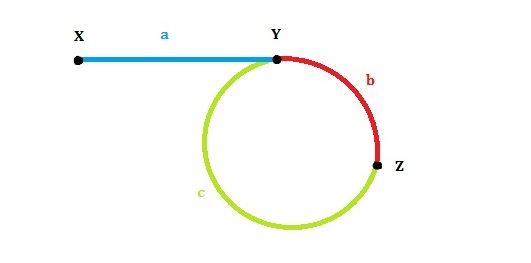Linked List Cycle II
36% Accepted
Given a linked list, return the node where the cycle begins.
If there is no cycle, return null.
Have you met this question in a real interview? Yes
Example
Given -21->10->4->5, tail connects to node index 1,返回10
Challenge
- Can you solve it without using extra space?
Tags Expand
- Two Pointers
- Linked List
思路
- 参考资料

- 链表头是X,环的第一个节点是Y,slow和fast第一次的交点是Z。各段的长度分别是a,b,c,如图所示。环的长度是L。slow和fast的速度分别是qs,qf
- 第一次相遇时slow走过的距离:a+b,fast走过的距离:a+b+c+b。因为fast的速度是slow的两倍,所以fast走的距离是slow的两倍,有 2(a+b) = a+b+c+b,可以得到a=c(这个结论很重要!)。我们发现L=b+c=a+b,也就是说,从一开始到二者第一次相遇,循环的次数就等于环的长度。
- 当我们得到相交的点的时候,让slow回到dummy(dummy.next = head),重新来走一遍,这样当slow = slow.next fast = fast.next,他们相交的时候,这个点就是环的入口
/**
* Definition for singly-linked list.
* class ListNode {
* int val;
* ListNode next;
* ListNode(int x) {
* val = x;
* next = null;
* }
* }
*/
public class Solution {
public ListNode detectCycle(ListNode head) {
if (head == null) {
return null;
}
ListNode fast = head;
ListNode slow = head;
while (fast != null && fast.next != null) {
fast = fast.next.next;
slow = slow.next;
if (fast == slow) {
break;
}
}
if (fast == null || fast.next == null) {
return null;
}
slow = head;
while (slow != fast) {
slow = slow.next;
fast = fast.next;
}
return slow;
}
}